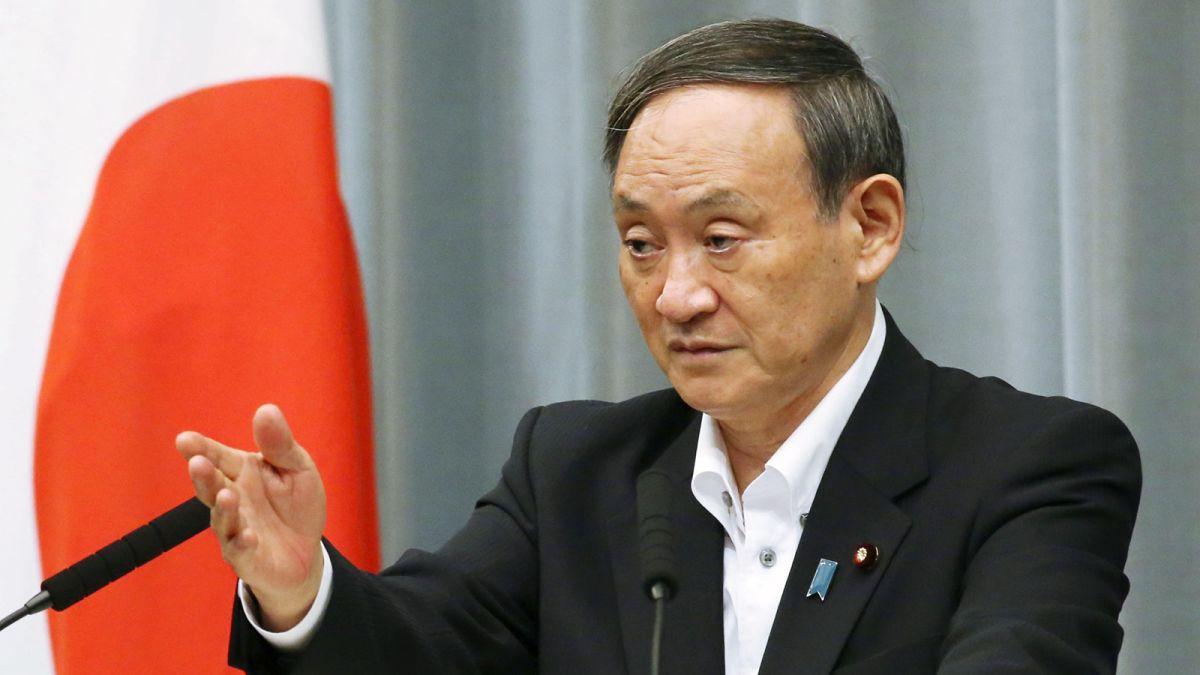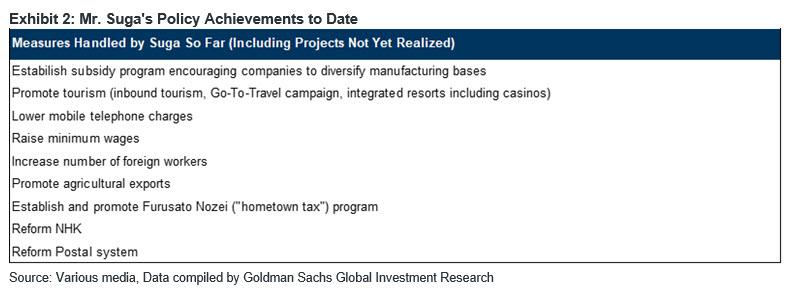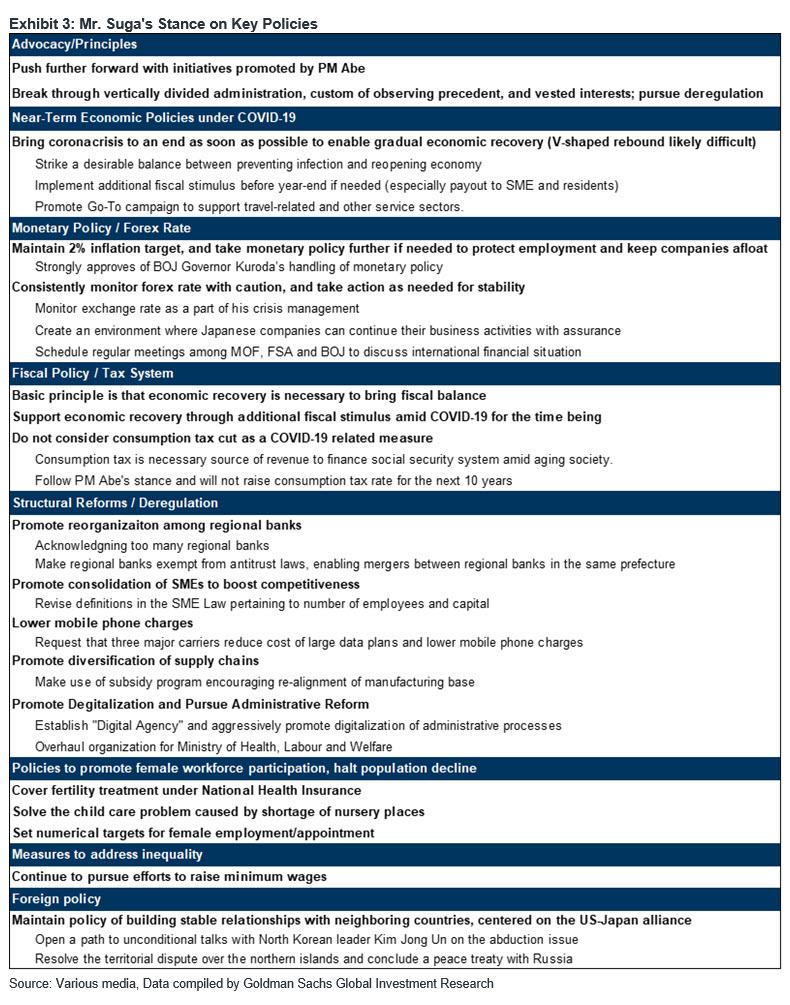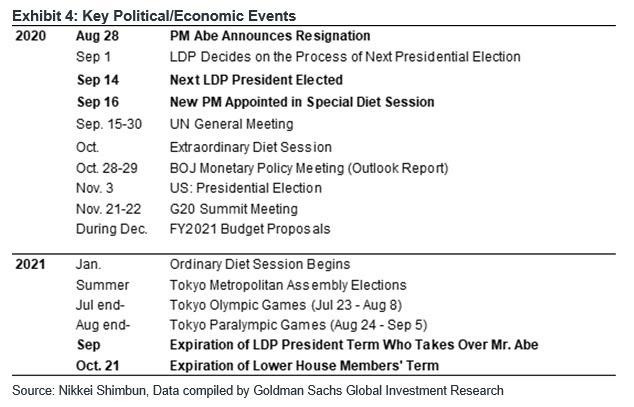Suga High: Abe’s #2 Becomes Japan’s Next PM After Landslide LDP Victory – What That Means For Japan
Tyler Durden
Mon, 09/14/2020 – 09:50
On Monday, two weeks after the (second and final) resignation by Shinzo Abe on Aug 28 who stepped down as Japan’s Prime Minister due to deterioration in a pre-existing health condition (the same condition he cited when he quit for the first time in 2007), Japan’s Liberal Democratic Party (LDP) held its presidential election to appoint a successor to current LDP leader (and Prime Minister) Shinzo Abe.

The election results show that Yoshihide Suga (Chief Cabinet Secretary) won a decisive victory over the other two candidates (Fumio Kishida and Shigeru Ishiba), as widely expected, and has been elected the next LDP president. The election will be immediately followed by the wholesale resignation of the current Abe cabinet, the appointment of Suga as the next Prime Minister during a special Diet session on September 16, and Suga forming his own cabinet.
So what does Suga’s election mean for Japan?
A look at Suga’s stance on key policies, courtesy of Goldman, reveals that he is keen on structural reforms and deregulation, maintaining the status quo. Suga has cited ensuring compatibility between preventing the spread of COVID-19 and reopening social and economic activity as his top priority for the time being.
On the economic policy front, Goldman’s Naohiko Baba writes that Suga’s key focus is to push forward with Abenomics, particularly the combination of the active deployment of fiscal stimulus and the large-scale monetary easing program. In short a continuation of Abenomics.
Although Suga has ruled out the possibility of lowering the consumption tax rate as a short-term stimulus measure, citing the need to generate revenue to fund social security amid population aging, he is open to the possibility of increasing various subsidies if needed.
In addition, Suga has emphasized the importance of maintaining a close relationship with the BOJ, as has been the case under the current Abe administration, and of promoting additional easing measures if deemed necessary to sustain employment and keep companies afloat. In particular, he has identified forex stability as a key area of his crisis management, and as a result, the possibility of the new administration encouraging the BOJ to decide additional easing measures, if the yen appreciates sharply, may garner market attention going forward.
Suga has also indicated a strong desire to tackle structural reforms and deregulation. He already has a robust track record of achievements in these areas, including promoting the furusato nozei (“hometown tax”) program and tourism (by promoting inbound tourism and the Go-To-Travel campaign, for example), expanding the number of foreign workers, lowering mobile telephone charges, promoting agricultural exports, and raising the minimum wage. Aside from continuous efforts to promote the above, Suga additionally expressed his strong willingness to facilitate reorganizing regional banks especially via mergers and digitalizing administrative procedures especially through the establishment of a “Digital Agency,” for example
On the foreign policy front, Suga has emphasized the importance of maintaining the US-Japan alliance, based on which he intends to build stable relationships with neighboring countries.
Suga’s term as LDP president will run through to September 2021, when Abe’s term was originally set to end, and at that point a full LDP presidential election will be held as originally planned. Another key timeline is the expiration of the term for the Lower House Diet members in October 2021. With this in mind, the new Prime Minister will face the option of either waiting until the end of his term to hold an election, or dissolving the Lower House and holding a general election before his term ends.
According to Goldman, the LDP may have a desire to avoid being forced to hold elections when there is little time left before the end of Lower House members’ terms in October 2021. It is also notable that support for a new Prime Minister tends to rise immediately after a change in administration. Given the industrial reforms and deregulation Suga desires to achieve will likely take time to implement, attention will focus on whether the new administration goes to the polls by year’s end in a bid to secure enough time for policy implementations. The key factors here will be how the COVID-19 pandemic pans out, and public opinion regarding a general election. In the event of a snap election, the debate will likely include the possibility of a third supplementary budget.
via ZeroHedge News https://ift.tt/2ZAzG53 Tyler Durden



